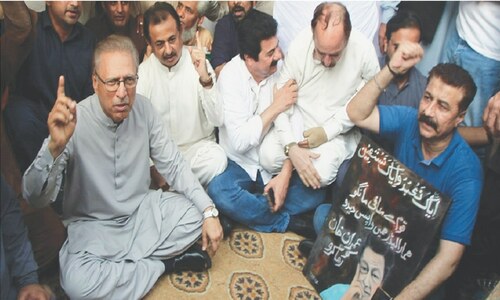BRUSSELS, Dec 8: Foreign ministers of the North Atlantic Treaty Organization (Nato) approved on Thursday a plan to expand the alliance’s peacekeeping force in Afghanistan into the volatile south of the country, after overcoming concerns about troop safety.
The so-called operational plan is expected to see British, Canadian and Dutch personnel take leading roles in the Nato push into the south around May, with 6,000 extra troops being added to the 9,500-strong force.
“Nato will then be operating in three quarters of the territory of Afghanistan,” said Secretary General Jaap de Hoop Scheffer, following talks with the military organization’s ministers in Brussels.
The plan notably sets out a ‘double-hatted’ command structure under which the NATO-led International Security Assistance Force (ISAF) will work more closely with the US-led Operation Enduring Freedom (OEF).
The ISAF will set up an extra four provincial reconstruction teams (PRTs), a mixture of troops and civilians helping to spread the Kabul government’s rule into the distant provinces, at all points of the compass except the east.
The move has been championed by the United States, but resisted by some European countries who fear being dragged into frontline combat operations and away from the peacekeeping role which is the main function of ISAF.
“Of course this expansion will take Nato into more volatile territory, but there should be no doubt... our forces will have the equipment and the support they need for the job,” de Hoop Scheffer told reporters.
“They will have the rules of engagement they need to carry out their mission and they will do something very important indeed, they will bring peace to more people in Afghanistan who have suffered terribly,” he said.
To fulfil its mission, ISAF’s rules of engagement — the political rules governing the use of deadly force — have been beefed up, not just in the south, but across the country.
“It is imperative in a military mission that there are no weak links, no weak spots,” a Nato spokesman said. “They will not be sent with one arm tied behind their back.”
Dutch Foreign Minister Ben Bot said the Netherlands had received guarantees that 1,100 of its troops likely to be working in the southern Oruzgan province would have the backing of OEF soldiers in any crisis.
Any prisoners they hand over to Afghan police will also be treated humanely and not face the death penalty. All ISAF detainees must be released or transferred to the Afghan authorities within four days.—AFP














































Dear visitor, the comments section is undergoing an overhaul and will return soon.